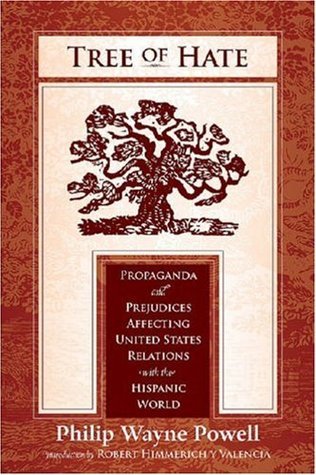What do you think?
Rate this book


210 pages, Hardcover
First published June 1, 1971
“What do we owe to Spain? In two centuries, in four, or even in six, what has she done for Europe? Nothing.”
Masson de Morvilliers
The basic premise of the Black Legend is that Spaniards have shown themselves, historically, to be uniquely cruel, bigoted, tyrannical, obscurantists, lazy, fanatical, greedy, and treacherous; that is, that they differ so much from other peoples in these traits that Spaniards and Spanish history must be viewed and understood in terms not ordinarily used in describing and interpreting other people.
Philip W. Powell
"The careful distortion of the history of a nation, perpetrated by its enemies, in order to better fight it. And a distortion as monstrous as possible, with the goal of achieving a specific aim: the moral disqualification of the nation, whose supremacy must be fought in every way possible."
Fernández Álvarez
ESPAÑA ¡¡ME TENÉS PODRIDO!!
por Patricio Lons
¿Cómo se te ocurre traer veinticinco universidades y luego irte si en las colonias inglesas se fueron sin dejar nada? ¡Y te atreviste a hacerlas con cátedras en lenguas nativas amerindias!! Encima construiste catedrales, museos, hospitales, escuelas, puertos y ciudades.
¡Y se te ocurrió construir escuelas para los hijos de los caciques y les diste la misma educación que recibían los nobles españoles. A tal punto llegaste con tu atrevimiento civilizatorio, que el primer informe que le presentaba a Carlos V una queja sobre las conductas de algunos encomenderos, lo escribió un indio alfabetizado y con estudios superiores en un perfecto castellano del siglo XVI.
¡¡¿¿Porque les diste títulos de nobleza a los caciques??!! ¿No ves que luego terminaron agradecidos y peleando por el rey Fernando VII con grados militares, incluso de generales en el ejército realista? A diferencia del ejército de Bolivar que contaba con 7.500 soldados ingleses y la flota inglesa llegando hasta El Callao.
Y luego nos trajiste a nosotros, a nuestros ancestros europeos, muchos que gracias a Hispanoamérica tuvieron un lugar donde refugiarse y así huyeron de miserias y horrores de muchas guerras. Y a muchos españoles se les ocurrió casarse con nativas ¡¡¡NNOOOOOOO!!! ¡¡Así no se hace!! ¡¿¿Debiste aprender de Inglaterra y Holanda que no dejaban vivo a nativo alguno??!
Te llevaste la plata que en América no tenía valor comercial y le dejaste el 90 % de la dieta cárnica y cerealera, redujiste la siembra de cuarenta a un solo día por hectárea, unificaste un continente, rescataste buena parte de las lenguas nativas que antes de ti, eran ágrafas y que luego con la independencia se volvieron a perder.
LLevaste a los pueblos de América de la Edad de Bronce y del Neolítico a la Era Moderna. Y trajiste al Nuevo Mundo el pensamiento griego, el orden romano, un idioma que les permitió unirse a todos los pueblos de un continente en un solo y gran imperio y una religión que acabó con el canibalismo y los sacrificios humanos que tan felices hacían a los aborígenes; bueno, a algunos, porque a las víctimas no tanto.
¡Encima te pagaron con infamias!! Por eso, ¡me tenés podrido!!
¿O me pudrieron el cerebro que no puedo ver que la leyenda negra...es negra, es mentirosa?
¿A quien le conviene que yo viva engañado? Me parece que me debo hacer muchas preguntas.
Sobre todo ¿porqué vamos de mal en peor desde hace doscientos años?